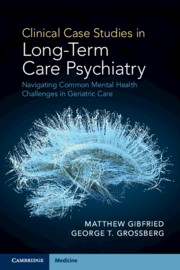 Clinical Case Studies in Long-Term Care Psychiatry
Clinical Case Studies in Long-Term Care Psychiatry Sexually Inappropriate Behavior
from Section 7 - Miscellaneous Neuropsychiatric Disorders Affecting Patients in Long-Term Care
Published online by Cambridge University Press: 31 October 2024
Sexually inappropriate behavior can be a manifistation of disinhibited behavior seen in older adults with major neurocognitive disorders. Sexual expression in older adults with major neurocognitive disorders is normal and should not be universally discouraged when in an appropriate setting and when the rights of others are not violated. The evaluation of sexually inappropriate behavior should include a detailed history that includes what the behavior is, who is involved, what is the context of the behavior, who is being impacted, and if the behavior is out of proportion with other disinhibited behaviors. Look for and potentially remove medications that could be contributing to sexually inappropriate behavior including dopamine agonists, anticholinergic agents, and benzodiazepines.
To save this book to your Kindle, first ensure no-reply@cambridge.org is added to your Approved Personal Document E-mail List under your Personal Document Settings on the Manage Your Content and Devices page of your Amazon account. Then enter the ‘name’ part of your Kindle email address below. Find out more about saving to your Kindle.
Note you can select to save to either the @free.kindle.com or @kindle.com variations. ‘@free.kindle.com’ emails are free but can only be saved to your device when it is connected to wi-fi. ‘@kindle.com’ emails can be delivered even when you are not connected to wi-fi, but note that service fees apply.
Find out more about the Kindle Personal Document Service.
To save content items to your account, please confirm that you agree to abide by our usage policies. If this is the first time you use this feature, you will be asked to authorise Cambridge Core to connect with your account. Find out more about saving content to Dropbox.
To save content items to your account, please confirm that you agree to abide by our usage policies. If this is the first time you use this feature, you will be asked to authorise Cambridge Core to connect with your account. Find out more about saving content to Google Drive.